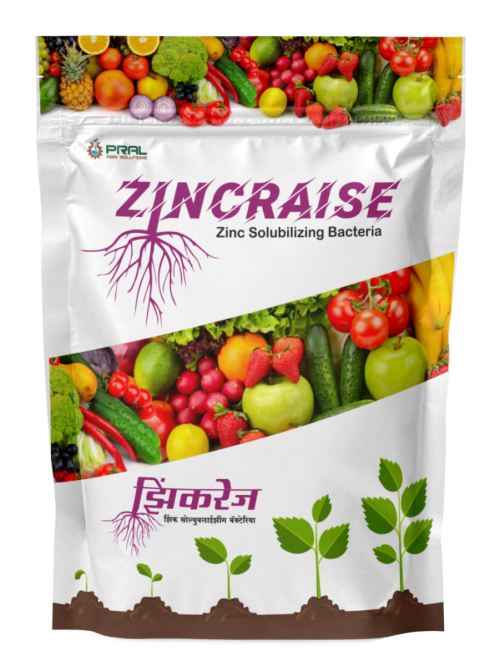
ZINCRAISE
- A Formulation Containing Zinc Solubilizing Bacteria (Thiobacillus, B. pumilus, Rhizobium) not less than 5×107 CFU/g
- It is a dextrose based biofertilizer
KEY BENEFITS:
- Increases the higher zinc efficiency in crops
- Elicits the plant defence system by increasing nutrient mobility
- Effective against root and stem which causes damping
- Plays an important role in plant’s response to biotic stress
- Quality and shelf life of the produce is enhanced
- Helps in improving crop productivity
DOSAGE: For soil application: 1-2kg/acre, for seed treatment: 5-10 g/kg of seeds.
ZINCRAISE: Zinc solubilizing bacteria are beneficial in increasing the availability of zinc as a micronutrient in the soil. Micronutrients such as zinc and iron are not available to the crops in the soil with increased soil pH even if the soil is fertile or humus. The application of zinc-up also results in greater absorption of zinc by the crop in such soils.
Zinc solubilizing bacteria (ZSB):
Zn is an essential trace element necessary for all crops. It is an important metal component required for almost all biological enzymatic activities. Deficiency of Zn would lead to physiological stress due to which many enzymes fail to perform their function, altering the rate of metabolic reaction. Roughly, 2800 proteins require Zn for their structural intactness and biological activity. Plants assimilate Zn as a divalent cation (Zn+2) which is required for performing several metabolic processes, photosynthesis, auxin biosynthesis, fertilization and resistance to certain infectious pathogens.
Pseudomonas, Bacillus, Acinetobacter, Gluconacetobacter, Thiobacillus and Rhizobium are some of the most powerful Zn solubilizing bacteria (ZSB) which efficiently boost soluble Zn in the soil and benefit plant growth and yield. ZSB have the ability to solubilize the various insoluble Zn components to improve the bioavailability of zinc to crops.
Serious threat to the plant-soil system is the formation of insoluble zincate due to Zn fertilizer applications. ZINCRAISE is potential alternative converting insoluble soil Zn into soluble Zn form. During growth, the soil microbes synthesize organic acids which combine with surface of minerals present in the soil particles and impound the zinc cations, thereby decreasing the pH of the nearby soil. The anionic organic acids such as gluconic and ketogluconate in multiple conformations can chelate Zn through carboxyl and hydroxyl groups and enhance Zn solubility, thereby enhancing the mineral uptake by the plant. Apart from organic acid production, other processes such as siderophores production, cell membranes proton system and chelating ligands are involved in Zn solubilization. Among ZSB, Bacillus sp. and Pseudomonas sp. have the Zn solubilizing ability through the production of organic acids such as formic acid, acetic acid, propionic acid, lactic acid, glycolic acid, fumaric and succinic acid.
ZINCRAISE fulfil the Zn demand of the growing crop maintaining soil fertility and enhancing crop productivity without causing any environmental hazard.
Recommended crops: All crops- Food Crops (Wheat, Maize, Rice, Millets and Pulses etc.), Cash Crops (Sugarcane, Tobacco, Cotton, Jute and Oilseeds etc.), Plantation Crops (Coffee, Coconut, Tea, and Rubber etc.), Horticulture crops (Fruits and Vegetables).
